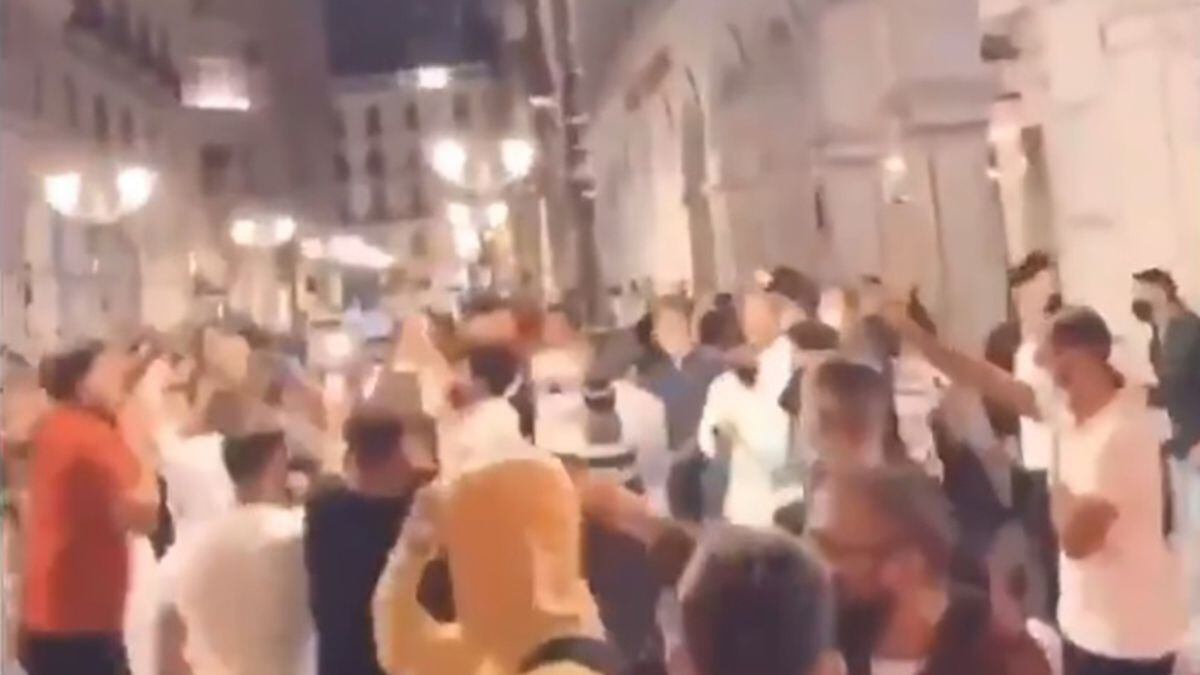Andalusia, Valencia announce curfews to curb coronavirus transmission
After a meeting of health authorities failed to produce an agreement on nationwide restrictions, Spanish regions are taking the initiative to limit nighttime activity
/cloudfront-eu-central-1.images.arcpublishing.com/prisa/TPYDQOQYSBA6HEDVOLMH3RRT74.jpg)
The Spanish regions of Andalusia, Castilla y León and Valencia will be the first to introduce curfews in Spain in a bid to contain the accelerating spread of the coronavirus.
The announcements come after a meeting of central and regional health authorities on Thursday failed to produce a consensus on a nationwide nighttime curfew, despite support for such a move from the central government and a majority of regional authorities.
In Andalusia, there will be an 11pm-to-6am curfew in the city of Granada and 30 municipalities in its metropolitan area, due to go into effect on Sunday. The Andalusian government’s decision is still pending legal backing from the regional high court.
Granada has been experiencing a surge in coronavirus cases, with the 14-day cumulative number of cases per 100,0000 inhabitants now at 966, far above the threshold of 500 set by the central government to start adopting restrictive measures. For now, however, regional authorities are not considering introducing a perimetral lockdown, as other parts of Spain have done.
In the Valencia region, premier Ximo Puig announced shortly after the Thursday meeting that a midnight-to-6am curfew will be introduced across the region in the coming days, and that he is planning to extend it until December 9. Puig has asked the regional high court to back the move.
The deputy premier of Castilla y León, Francisco Igea, said a curfew will go into effect in the region on Friday. Igea said the restrictions will begin “at 9pm or 10pm,” and described the outcome of the Thursday meeting as “disappointing” due to the lack of consensus on a national curfew.
And Melilla, on the northern coast of Africa, has asked the central government to declare a state of alarm in the exclave city to provide the legal backing for a curfew there as well. The 14-day cumulative number of coronavirus cases in Melilla is 883.37 per 100,000 inhabitants, one of the highest in Spain, and nearly 60% of intensive care beds are occupied by Covid-19 patients.
Seeking national consensus
Following the Thursday meeting of the Inter-Territorial Council of the National Health System, which brings together the country’s regional healthcare chiefs, Spanish Health Minister Salvador Illa said that his department is still seeking a consensus to apply curfews across Spain. But the legal tools to do so are still a source of debate.
“The best legal tool for a curfew across the territory is the state of alarm. Our legal services have been analyzing it for a long time. But we will continue to consider it and think it out at the Council,” he said. In mid-March, the central government invoked this constitutional tool to put the entire country under a total lockdown. More recently, a state of alarm was declared for the Madrid region that is due to expire on Saturday, when perimetral confinements on the capital and eight other cities will be lifted.
Fernando Simón, the head of the Coordination Center for Health Alerts and Emergencies, said that a curfew would help contain the virus: “I don’t know what legal format it should have. But several spheres of transmission have been controlled [among seasonal laborers and at meatpacking factories] and now flare-ups are taking place in very specific environments. Limiting nighttime mobility could greatly favor control over transmission, because that is where the main hotspots are.”
The meeting did produce a series of measures that were approved by all regional representatives save for those from Madrid and the Basque Country, who abstained until they see the final document of a new alert level system and its associated restrictions.
Curfew time
Curfews are already being applied in France, with the goal of further limiting social gatherings. But depending on the timeframe, the results can vary greatly, said Ildefonso Hernández, spokesperson for the Spanish Society for Public Health (Sespas), noting that some studies have observed an 18% reduction in transmission. “But these are studies in very different countries, and they need to be adapted to the local context. I suppose regional governments will have data showing where the greatest transmission is taking place, to introduce limits at those times,” he explained.
The epidemiologist Javier del Águila agrees that the key lies in the curfew times. In Granada, the first Spanish city to introduce the measure, people must be home by 11pm. “From that time on, it can have an effect on outdoor group drinking, on parks, because bars and restaurants were already closed by then in many regions of Spain with high incidence rates. Starting at 9pm or 10pm would have a more radical impact, because that would not just affect late-night activities but also limit dinners and gatherings,” he noted.
Although it may sound like a drastic measure, Del Águila believes that the sooner it is adopted, the greater the effect. “During the first wave, hesitation about home confinements led us to postpone them, and that was worse.”
English version by Susana Urra.

/cloudfront-eu-central-1.images.arcpublishing.com/prisa/JLKLYH2MFVDHVK2H6WKMRYW6PY.jpg)
/cloudfront-eu-central-1.images.arcpublishing.com/prisa/XOSHRH7VINCSZLX5QVNWILDXIU.jpg)










































